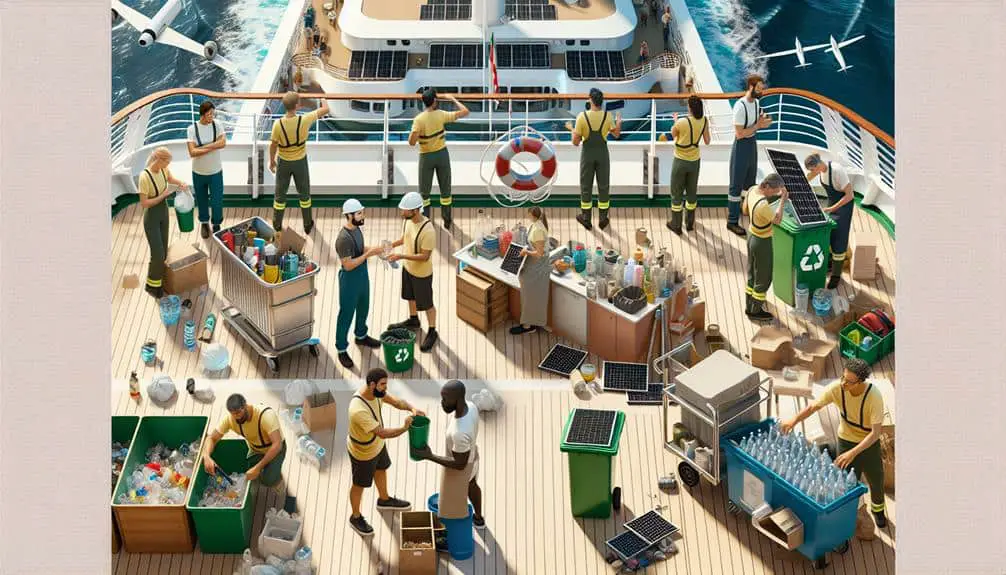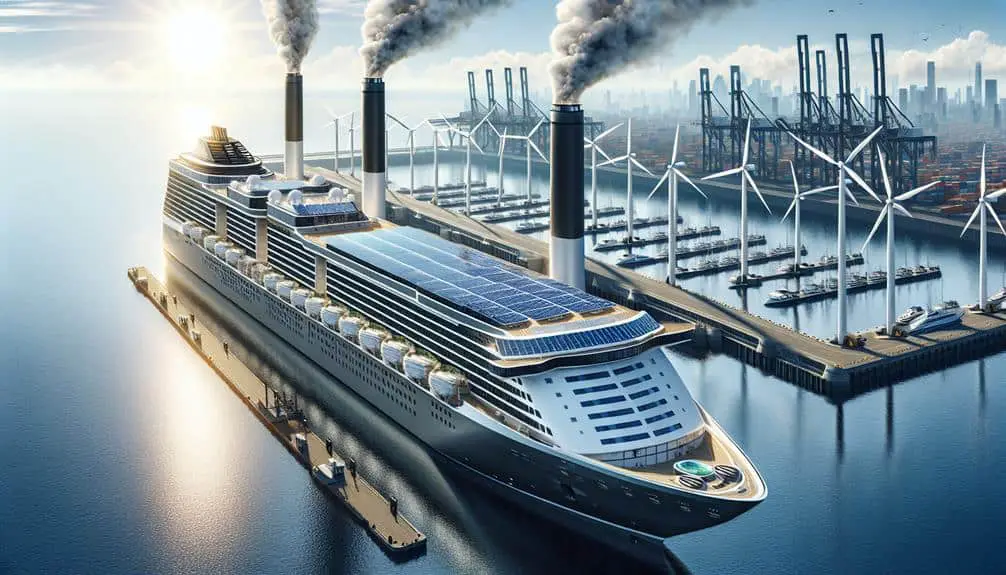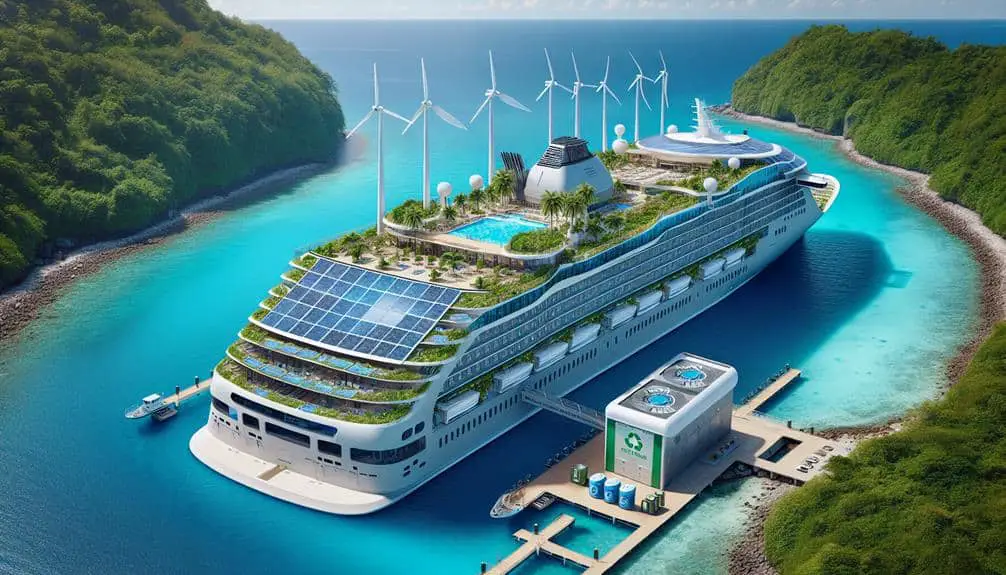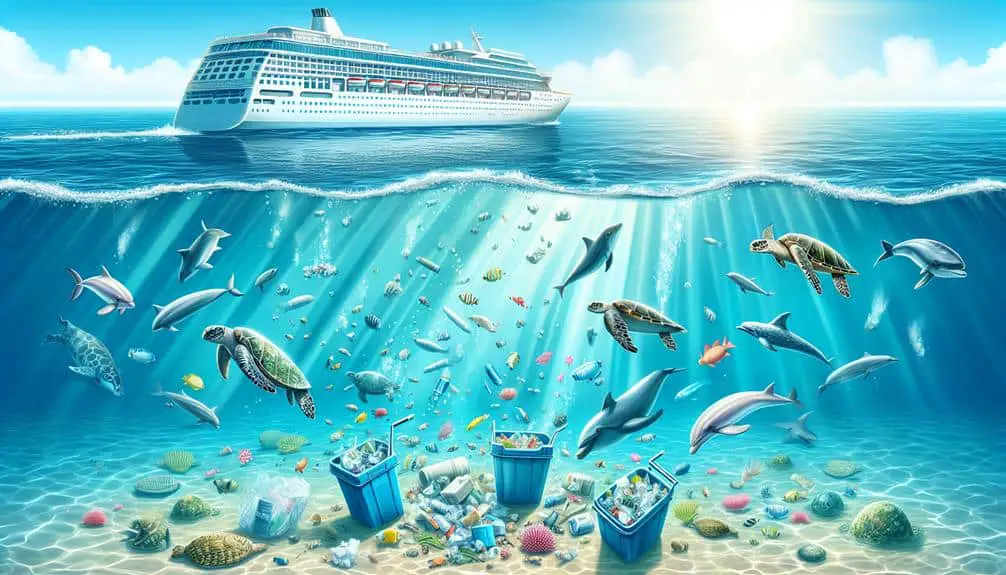Implementing sustainable practices on cruise ships involves energy-efficient lighting with smart bulbs and solar panels. Waste reduction programs include composting, recycling, and plastic elimination. Sustainable food practices focus on local sourcing, organic options, and minimizing waste. Water conservation uses greywater recycling and eco-friendly desalination. Green technology integrates renewable sources like solar and wind power, advanced propulsion systems, and carbon offsetting. Embracing these practices can lead to a more eco-friendly cruising experience with reduced environmental impact, showcasing a commitment to responsible maritime travel. Find out how these initiatives benefit both the environment and passengers onboard.
Key Points
- Install greywater recycling systems for water conservation.
- Integrate renewable energy sources like solar panels.
- Implement waste reduction programs and circular economy strategies.
- Source sustainable food locally to reduce carbon footprint.
- Utilize green technology for fuel efficiency and carbon offsetting.
Energy-Efficient Lighting Solutions
To enhance sustainability onboard cruise ships, implementing energy-efficient lighting solutions is imperative for minimizing energy consumption and reducing environmental impact. Smart bulbs have emerged as a key component in achieving this goal, offering cruise ships the ability to adjust brightness levels based on natural light and occupancy.
By integrating smart bulbs throughout the ship's common areas and cabins, energy usage can be optimized, leading to significant reductions in electricity consumption. Additionally, the use of solar panels to power lighting systems provides a renewable energy source that further decreases the ship's carbon footprint.
Solar panels harness sunlight and convert it into electricity, offering a sustainable and eco-friendly alternative to traditional power sources. This combination of smart bulbs and solar panels not only reduces energy consumption but also contributes to a more environmentally conscious operation of cruise ships.
Waste Reduction and Recycling Programs
Implementing waste reduction and recycling programs is essential for cruise ships to minimize environmental impact and promote sustainable practices onboard. Composting initiatives play an important role in managing organic waste effectively. By separating food scraps and other biodegradable materials for composting, cruise ships can reduce the amount of waste destined for landfills.
Waste segregation is also important for proper recycling. Implementing clear systems for separating different types of waste, such as paper, plastics, and glass, guarantees that recyclable materials are diverted from general waste streams.
Circular economy strategies can further enhance waste reduction efforts on cruise ships. By implementing practices that focus on reducing, reusing, and recycling materials onboard, cruise lines can minimize the generation of waste and promote a more sustainable approach to resource management. Plastic reduction is a significant component of these strategies. Cruise ships can adopt measures such as eliminating single-use plastics, providing refillable containers, and partnering with suppliers that offer sustainable packaging solutions to reduce plastic waste onboard.
Sustainable Food Sourcing Practices
Effectively sourcing sustainable food options for cruise ship operations is crucial for reducing environmental impact and promoting responsible consumption practices onboard. When it comes to sustainable food sourcing practices, prioritizing local sourcing and offering organic options are key strategies for cruise ships.
Local sourcing involves obtaining food from nearby suppliers, reducing the carbon footprint associated with transportation. By partnering with local farmers and producers at ports of call, cruise ships can offer fresh, seasonal ingredients while supporting the local economy. Additionally, sourcing organic options guarantees that food is grown without synthetic pesticides or fertilizers, promoting biodiversity and soil health.
Implementing these practices not only enhances the overall sustainability of cruise ship operations but also provides guests with high-quality, ethically sourced meals. By choosing local and organic food options, cruise lines can demonstrate their dedication to environmental stewardship and responsible food consumption, offering passengers a truly eco-conscious dining experience onboard.
Water Conservation Measures
Conserving water onboard cruise ships requires meticulous planning and adherence to sustainable practices. One effective water conservation measure is the implementation of greywater recycling systems. These systems treat wastewater from sinks, showers, and laundry facilities, filtering it to remove impurities. The filtered water can then be repurposed for non-potable uses like flushing toilets or cleaning decks, reducing the overall water consumption onboard.
In addition to greywater recycling, exploring desalination alternatives can also aid in water conservation efforts. Desalination is the process of removing salt and other minerals from seawater to produce fresh water. While traditional desalination methods can be energy-intensive, advancements in technology have led to more eco-friendly desalination processes that are suitable for cruise ships.
Green Technology Integration
To further enhance sustainability practices on cruise ships, incorporating green technology integration is paramount for reducing environmental impact and optimizing resource utilization. Renewable energy sources such as solar panels and wind turbines can be integrated into cruise ship designs to supplement traditional power sources, reducing reliance on fossil fuels and decreasing greenhouse gas emissions. Advanced propulsion systems like LNG engines or hybrid solutions can also enhance fuel efficiency and minimize pollution.
Furthermore, implementing carbon offsetting programs can help cruise lines neutralize their carbon footprint by investing in projects that reduce or remove greenhouse gas emissions from the atmosphere. These initiatives can include supporting renewable energy projects, reforestation efforts, or energy efficiency programs in communities where the cruise lines operate.
Frequently Asked Questions
How Do Cruise Ships Manage and Dispose of Hazardous Waste Materials, Such as Chemicals and Batteries?
When managing hazardous waste like chemicals and batteries, cruise ships follow strict protocols. Chemical disposal involves proper storage, labeling, and offloading at designated facilities. Battery recycling programs are implemented to guarantee safe handling and environmentally friendly practices.
Are There Any Initiatives in Place to Reduce Air Pollution Emissions From Cruise Ships?
To reduce air pollution emissions from cruise ships, various initiatives focus on emission reduction strategies and sustainable fuel options. Technology advancements aid in improving air quality through innovative solutions and more efficient engine operations.
What Measures Are Taken to Ensure That the Seafood Served on Cruise Ships Is Sustainably Sourced?
To guarantee seafood on cruise ships is sustainably sourced, responsible practices like certification programs, traceability systems, and partnerships with sustainable fisheries are implemented. This promotes environmental stewardship and minimizes the impact of seafood consumption.
How Do Cruise Ships Manage and Treat Greywater and Blackwater From Onboard Activities?
You manage greywater and blackwater on cruise ships through advanced water recycling systems. These systems efficiently treat wastewater from onboard activities, mitigating the environmental impact. Implementing sustainable practices guarantees responsible handling of these waste streams.
Are There Any Efforts to Integrate Renewable Energy Sources, Such as Solar or Wind Power, Into the Operations of Cruise Ships?
To enhance sustainability, cruise lines are increasingly integrating wind power, like utilizing sail technology or wind turbines. Energy efficiency initiatives include LED lighting, advanced propulsion systems, and optimized routing to reduce fuel consumption and environmental impact.




